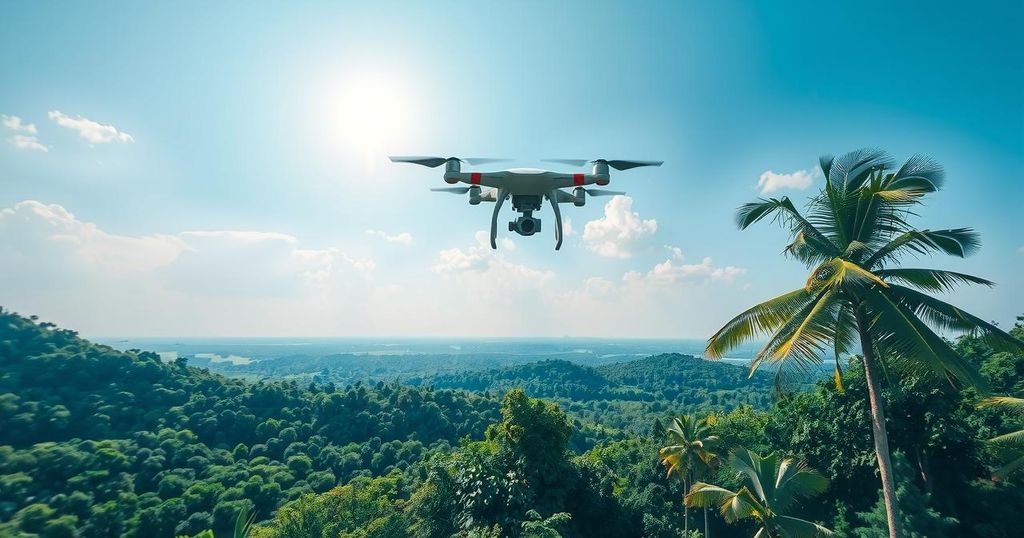The Yanomami Indigenous Land in Brazil is utilizing drone technology for monitoring and protection from illegal mining activities. Following years of neglect from the government, the Hutukara Yanomami Association has trained youths in drone operation, aiming to empower them as custodians of their territory. With the recent support of a new administration, hopes for effective ecological protection are renewed, although challenges remain.
In Brazil’s Yanomami Indigenous Land, the largest in the country, leaders are leveraging the skills of the youth to preserve their cultural legacy and protect their territory, which spans nearly the area of Portugal. This Indigenous territory, situated in the Brazilian Amazon between Roraima and Amazonas, is under threat due to the invasion of approximately 20,000 illegal miners seeking gold and cassiterite, leading to significant humanitarian and ecological crises.
In response to the invasion, trained Yanomami youth are now equipped to employ drones for land monitoring, thereby enhancing their ability to protect their ancestral land, which encompasses around 10 million hectares. Faced with the challenge of surveilling such a vast area without additional resources, the Yanomami community turned to innovative drone technology as a solution to monitor illegal activities occurring within their territory.
The humanitarian crisis escalated as prior appeals to the Brazilian government were largely ignored during Jair Bolsonaro’s presidency, which openly supported mining on Indigenous lands. In light of the government’s inaction, the Hutukara Yanomami Association initiated a project in 2022, aimed at training youths in drone operation and surveillance to gain greater control over their environment concerning illegal activities.
Maurício Ye’kwana, director of the Hutukara Yanomami Association, began this initiative by collaborating with international supporters, emphasizing the need for innovation among the youth. The program trained young operators to not only monitor their territory but to also act as educators for their communities, thereby multiplying the benefits of drone technology to safeguard these traditional lands effectively.
A recent participant, 26-year-old Cidiclei Palimitheli, expressed the benefits of the drone training he received, noting that it empowered him to monitor encroaching miners more effectively. The courses provided included hands-on drone operation training, enabling participants to autonomously map critical areas of their territory, thus enhancing their security against invasive threats.
Since the inception of this program, three comprehensive training workshops have been conducted in affected communities, focusing on practical and theoretical knowledge of drone operation specific to monitoring mining activities. The initiative aims to expand across the entire Indigenous territory, emphasizing immediate threats related to illegal mining and enhancing environmental protection.
Following the election of president Luiz Inácio Lula da Silva in 2023, the Yanomami community has witnessed renewed hope for government support in protecting their territory. The new administration has committed to evicting illegal miners, which has resulted in more frequent raids and a significant reduction in mining activities ahead of projected environmental remediation efforts.
Despite government action, many challenges remain. The continuous return of illegal miners signifies that the Yanomami cannot solely rely on external interventions. The Hutukara association collaborates with the Indigenous Council of Roraima for ongoing training, aiming to maintain an effective surveillance system led by the very people most affected by these illegal operations.
Agronomist Giofan Erasmo from the CIR expressed satisfaction with the training’s success and confirmed that the indigenous trainees have made considerable progress with drone technology. With advanced training completed, these trainees have begun to share their knowledge, fostering self-sufficiency, empowerment, and an improved understanding of their extensive territory.
Through this innovative partnership and community-driven training, the Yanomami youth are enhancing their capacity to protect their lands while utilizing technology that was previously inaccessible to them. Continued initiatives are essential for their ongoing education and adaptation to safeguard their environment in the face of persistent external threats.
The Yanomami are embracing drone technology to protect their territory from illegal mining, empowered by ongoing training initiatives. After facing governmental neglect, they have taken the initiative to build surveillance capabilities among their youth, leading to increased monitoring of their lands. As the new administration shows support for Indigenous rights, the Yanomami aim to cultivate long-term self-reliance in safeguarding their ancestral home. Continuing these efforts will be vital for preserving their heritage and protecting the environment.
Original Source: news.mongabay.com






